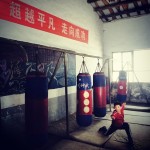I am in Hohhot, Inner Mongolia this weekend to watch the RUFF Superfight. RUFF is the number one mixed martial arts organization in China and this is their big bang: five champions will emerge out of tomorrow’s fights, the first belts given out by RUFF in their two year-history in China.
It’s a big deal for MMA in China and a big deal period. No other MMA organization has national champions and no other organization is so firmly entrenched in one country the way RUFF is in China. You could say that the only way MMA could thrive in China is by awarding national championship belts, but RUFF is by all accounts a serious MMA outfit with excellent quality control when it comes to fighters, safety, judging, and venues. So it doesn’t really matter whether or not RUFF’s deal with the Wushu Association (and by extension the government) stipulated national champs: tomorrows winners are bona fide MMA champs.
And that is the first step toward a bona fide MMA following in China, where martial arts has a long and storied tradition.
For me, the chance to watch an MMA fight live is great; I also have an inside track to the fighters, promoters and other people involved, and in terms of The Last Masters project … the rise of MMA and its relationship with Wushu and Kungfu is part of the story. Being here and talking with people and soaking up the atmosphere may help me get closer to answering questions like: What is the future of Chinese Martial Arts? What will survive and what will not?
What is the CMA scene like now? Where is it headed? How will MMA, Wushu and Kungfu develop (together? apart? or in competition with each other?) … Can a belief system co-exist with a sport? Are they mutually incompatible? Will we ever see kungfu as part of an MMA fighter’s repertoire? Is Sanda Kungfu?
I’ll keep you posted with what I see and hear, but it would be great if some readers posted a few questions or thoughts concerning the relationship between Mixed Martial Arts and Traditional Martial Arts …




Inner Mongolia! That seems like quite a trip. Sounds like this should be a great event. I look forward to your next update.
I think that kung fu and MMA are almost necessarily two different things because kung fu is really ineffectual in actual MMA matches. This makes (traditional) Chinese martial artist basically unfit to complete in MMA because they will lose to the predominant fighting styles like Muay Thai and BJJ.
I was listening to the Joe Rogan podcast yesterday (professional MMA commentator, 2x national taekwondo champion, BJJ black belt) and he spoke about kung fu as it relates to MMA specifically. He said that pre-MMA everyone thought that Wing Chun was really badass, but when it was routinely pitted again other martial arts they found that that was not the case at all.
This revelation about the efficacy of kung fu against competing martial arts plays a big role in the potential of kung fu to survive in the modern age. I think as time passes people are understanding that kung fu (along with karate, for example) are comparatively pretty ineffectual in actual combat situations. I think this is why we’re seeing the proliferation of Muay Thai and BJJ worldwide – because they have a center-stage position in MMA which is among the fastest growing sports in the world.
Can you link that podcast? And I disagree that kungfu is ineffectual. Every Chinese fighter here has a kungfu background – to varying degrees – so RUFF could be the proving grounds.
Check iTunes for The Joe Rogan Experience, but you’ll have to wade through a 2+ hour podcast to find that one line. I googled Joe Rogan + kung fu and found this: http://www.youtube.com/watch?v=D9L5vr3HKdE
I don’t think that kungfu is necessarily ineffective in the world of MMA. So far it has not had a major impact, but that is not necessarily due to an inherent practical uselessness of the technique, but more due to the lackluster overall MMA pedigree of its high level practitioners. In order for a school of combat sport to become effective, there must be a number of consummate MMA fighters – well rounded in all aspects of the sport – who are also experts in their particular school.
If a master is a one-dimensional fighter, he his not going to get very far in the MMA world, and he will not have a chance to advance his craft by showing its effectiveness. If there were a kungfu expert who could wrestle, maybe he would be able to (avoid being taking down, and thus) show the usefulness of kungfu. Then wrestlers might bother learning kungfu, (instead of just boxing and muy thai,) and you could get the ball rolling.
I disagree, there are high level kung fu fighters all around the world, yet none of them have translated their expertise into wins in an MMA ring. The reason is because it is necessarily ineffective against competing striking martial arts in MMA.
Cung Le is usually cited as “the kung fu guy” in MMA but he uses sanda as you probably know, which hardly even resembles traditional kung fu. That’s why the Chinese military developed it (in recent decades) with kickboxing and grappling – to make it effective in combat.
Traditional kung fu? Nowhere to be seen in MMA.
think the first part is true, but you’re cause-effect judgement is off. Kungfu has not entered MMA, but not necessarily because it is useless. Based on conversations I have had with MMA fighters and refs here and based on my own experience training kungfu, I think it is a matter of time – not effectiveness – before we see kungfu in MMA.
Also Sanda is striking and kicking with a lot of the training and background coming from kungfu – only one possible son of the father – I think there will be more, and people here at RUFF who fight and train agree.
Kung fu masters participated in some of the early UFC fights, but they were dispatched with ease by wrestlers and other strikers (mostly muay thai).
I had a lot of conversations about jiu jitsu and MMA when I was in the states last summer, kung fu came up a few times when they found out that I was living in China. In a lot of ways BJJ is the opposite of kung fu in that BJJ is very young and growing quickly, kung fu is very old and has been in decline for decades, kung fu is largely localized to China and BJJ is very international. Of the hundreds of worldwide types of martial arts, only a handful are very effective in MMA, which is why it’s rare to
I’m attracted to the philosophic and religious ties that kung fu was created in, that’s what makes it different from other martial arts to me. It’s probably the most glorified martial art of them all since the vehicle for its spread was the Hong Kong film industry which produced a lot of timeless cinema. In the Western mind, kung fu is a relic of the 1970’s more than anything. Ninjitsu is a relic of the 80’s and jiu jitsu emerged in the 90’s but it was its efficiency in early UFC matches that was the turning point. I interviewed MMA trainers and fighters in the US and at least half a dozen of them shared the same story when asked how they got into jiu jitsu. They saw small brown guys reliably and easily submit opponents much larger and more physically threatening than them and said to themselves: “That’s what I want to learn”.
For kung fu to make an impact on MMA it requires practitioners who are well-rounded mma fighters, not simply an abundance of high level kung fu fighters around the world. People similarly wrote off Karate as being useless in the realm of contemporary MMA (despite having many high level practitioners around the world) until a Karate expert with a well round MMA game emerged and became UFC champion. Kung fu is just waiting for its Lyoto Machida to arrive.
Lyoto Machida is a good argument for the eventual prospect of a successful kung fu fighter emerging in MMA, although there have been dozens of people using karate in MMA with success (Chuck Liddell, Bas Rutten, GSP, dozens others). It’s a fundamentally different striking art than kung fu though, kung fu is fluid and cyclical movements and it’s those type of movements which haven’t caught on in MMA. Aikido is similar to kung fu in that it’s a force redirection martial art that has never really been used to much effect in MMA. In contrast, karate is very crisp and linear striking movements – those seem to translate well.
Sascha, were there locks, traps, and some of the traditional kung fu moves at the MMA fight over the weekend?
Actually they are not fundamentally different, Karate is a style of Kungfu picked up by the Japanese. Those kicks and strikes – moving forward on a straight line etc, are straight out of traditional kungfu. In fact, virtually every form of striking is present in kungfu. Its the grappling and submitting that is new. And even that comes from Japanese jiujitsu. I guess I need to look into the history of jiujitsu more to see the roots of it.
Kungfu has dozens of applicable techniques, they just need to be applied in MMA and that’s starting now with RUFF blowing the sport up on the Mainland.
Here is a guy using a form of kungfu in the ring …
http://www.mmamania.com/2013/1/29/3915702/one-fc-lightweight-peter-davis-wants-to-prove-that-kung-fu-can-work
and it’s just like you said Eli, he knocked someone out and now all he has to do is round his game out and then knock someone out again and already the idea of kungfu being useful become much more real.
there are techniques and strikes in the style I practice that, if used my a master who knows some BJJ, could be very very dangerous. BJJ kid was in my master’s schools dropping into horse stances and swinging elbows at a wooden man last month.